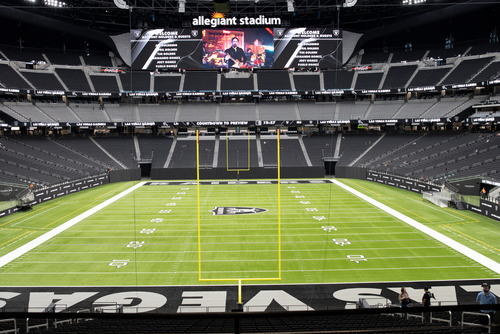Allegiant Stadium, home of the Las Vegas Raiders, announced it has been awarded LEED Gold Certification by the U.S. Green Building Council (USGBC).
LEED (Leadership in Energy and Environmental Design) is the world’s most widely used green building rating system and is an international symbol of excellence. Allegiant Stadium is now one of seven NFL stadiums to achieve LEED certification.

In addition to the LEED Gold Certification, Allegiant Stadium was recently recognized by the Green Sports Alliance at its annual summit, receiving a 2023 Play to Zero Award for its waste diversion program. These recognitions cement Allegiant Stadium and the Las Vegas Raiders as leaders in sustainability in sports, entertainment, and the corporate event market.
“Allegiant Stadium is thrilled to reach the tremendous achievement of LEED Gold Certification for our sustainability efforts,” said Samantha Johnson, SVP of sales and leader of the sustainability efforts at Allegiant Stadium. “As sports and entertainment industry leaders, our comprehensive sustainability initiatives have set the bar and greatly benefited the Las Vegas community and our clients.”
“The Las Vegas Raiders commit to excellence in everything we do, including sustainability efforts,” said Christopher Sotiropulos, VP of stadium operations for the Las Vegas Raiders. “The LEED Gold Certification is a testament to our commitment to creating a healthy and environmentally conscious space at Allegiant Stadium for Raider Nation, our players, fans, and the community we call home.”
The stadium’s sustainability initiatives excelled in several areas in its LEED certification application. Those areas include:
- Materials and Resources: For its enhanced waste diversion practices, community support through materials donations, and the stadium’s green products purchasing policy.
- Sustainable Sites: For its integrated pest management planning, minimizing the use of herbicides and pesticides, invasive species controls, minimizing air pollution from maintenance equipment, reducing stormwater runoff and erosion, and efficient irrigation systems.
- Water Efficiency: For its utilization of high-efficiency indoor faucets and toilet fixtures, active monitoring of water uses towards improved efficiencies, and minimal landscape irrigation.
- Energy and Atmosphere: For its use of low-impact refrigerants, energy-efficient LED lighting, robust systems monitoring and management, and maximized efficiency in indoor climate control.
- Indoor Environmental Quality: For a robust tobacco-and-smoke-free facility, rigorous green cleaning protocols, effective ventilation for improved air circulation, low-impact materials, and high visitor satisfaction feedback.
- Transportation: For its advocacy and availability to pedestrian access, shuttle services to and from nearby hotels, adjacent public transit express bus stops, and isolated ride-share pick-off and drop-off locations.
“Achieving LEED certification is more than just implementing sustainable practices. It represents a commitment to making the world a better place and influencing others to do better,” said Peter Templeton, president and CEO of the USGBC. “Given the extraordinary importance of climate protection and the central role buildings play in that effort, Allegiant Stadium and the Las Vegas Raiders are creating a path forward through their LEED certification.”
For more info on Allegiant Stadium’s sustainability initiatives, click here.
ALSO READ: Synthetic Turf vs. Grass: Which Is Better for Your Athletic Fields?
